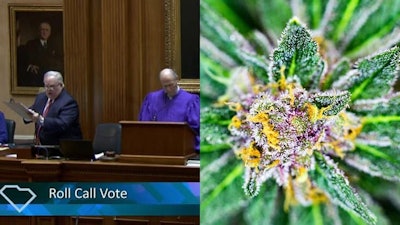
Three weeks of debating medical cannabis legalization culminated in the South Carolina Senate voting to approve a bill the author has dubbed as the most conservative in the nation.
The Senate voted, 28-15, on Feb. 9 to approve the SC Compassion Care Act on a second reading (passing it for all intents and purposes), before the legislation officially cleared the chamber via a third reading Feb. 10. It now heads to the House for consideration.

Debate on the legislation began Jan. 26 on the Senate floor, more than seven years after Sen. Tom Davis, a Beaufort Republican, started crafting legislation and advocating for a medical cannabis program.
“What I’m trying to do is let doctors do what they think is in their patient’s best interest. What is so radical about that?” Davis said on Jan. 26, before the debate extended to several more floor sessions. “What’s radical is, is that we’re letting law enforcement and politicians tell doctors what’s in their patient’s best interest. That’s what’s ludicrous!”
Through the past three weeks, Davis has continually advertised the legislation as one that would legalize the most conservative medical cannabis program in the country.
Specifically, the bill includes 13 qualifying conditions, with tight definitions of those conditions, and would require doctors to have in-person relationships with patients, run background checks for a history of substance abuse, and create written treatment plans. In addition, smoking cannabis as a method for use would be banned under the legislation.
RELATED: South Carolina’s Medical Cannabis Debate Enters Third Week
While the first two weeks of debate revolved around the parameters of the legislation and its potential impacts, senators focused their efforts on considering dozens of amendments Feb. 8 and Feb. 9.
Perhaps one of the most notable amendments taken up this week aims to dispense medical cannabis products through “therapeutic cannabis pharmacies,” rather than traditional dispensaries, and would require those retail facilities to have a state-approve pharmacist on site at all times.

During closing statements Wednesday evening, Sen. Ronnie Cromer, a Newberry Republican, said he would abstain from voting on the bill, specifically referencing the Frankenstein framework of the amendment process, and the fact that he is a licensed pharmacist.
“This is one of the few bills … that I have been on the fence,” he said. “I couldn’t decide which way to go for the last, gosh knows how long now. But after I’ve sat here and listened to all the amendments—there were a lot of good amendments that were put up—and I think now we have one of the most restrictive medical marijuana bills … in the whole United States.
“I just wanted to let you know that when I vote tonight, I am not shirking my responsibilities. Because the bill has been changed so drastically, and now it’s basically a pharmacy dispensary situation, I will … abstain.”
Another amendment approved includes a sunset provision that allows state lawmakers the leverage to address unintended consequences of bill through 2028.

Sen. Richard Cash, a Republican from Anderson, who was vocal throughout the three weeks of debate, said during his closing remarks on Wednesday that he was insistent on a sunset provision because he’s heard arguments from those who believe legalizing medical cannabis creates a slippery slope.
Cash also recognized that one reservation among those who oppose legalizing medical cannabis includes the fear that it would open the door to legalizing adult-use cannabis in the near future.
“Every state that has legalized recreational use of marijuana has done it either through a ballot initiative or it is a state where the legislature is controlled by the Democrats,” he said. “I don’t want to belabor the point, but, if we pass this bill, it doesn’t mean that a year from now this same group of people is going to come back and pass recreational marijuana.”
He added, “You cannot have a ballot initiative to make marijuana recreationally legal in this state. It’ll have to go through the chambers and be signed by a governor. And I can just say this: I will never support legalizing the recreational use of marijuana.”
Cash did vote “yes” on Wednesday, supporting the medical cannabis bill, saying that while he’s weighed the constitutional arguments against legalizing medical cannabis, he believes there is conclusive and substantial evidence that medical cannabis helps those suffering from certain conditions and that there’s a moral argument to alleviate that suffering.
In addition, he said that polls “even in my district” show that people want access to medical marijuana.
“I think it’s pretty obviously that I’ve had a lot of turmoil and conflict about this bill,” he said. “I know I’ve been quite active in putting forward amendments, and some of you might have thought the reason I was doing that was because I’m against the bill. The reason I was doing that was because [if the bill passes], I wanted it to be as good as we could make it, having gone through it with fine-tooth comb.”
Overall, South Carolina’s state senators considered more than 65 changes to the bill during seven floor sessions in the past three weeks. As the author, Davis said he welcomed changes that would make the bill better, and that he had worked with opponents to find middle ground before it reached the floor.
Sen. Katrina Shealy, a Lexington Republican, made it a point to note that Davis’ work to craft the legislation included countless hours and several years during her floor comments Jan. 26.
“You have done almost everything you can do to satisfy everybody in the state of South Carolina,” she told Davis.
With Thursday’s final approval from the Senate, the legislation now moves to the House, where members have until May 12 to approve it or let it die.
























